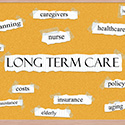
 Remember that all-important rite of passage? Having "the talk" with your kids about the birds and the bees? You thought for weeks...maybe months...about the words you would choose, how you would answer the challenging questions and handle the emotions involved. Now might be the time to experience another rite of passage, and have “the other talk" with your children about your plans for your life as you age.
Remember that all-important rite of passage? Having "the talk" with your kids about the birds and the bees? You thought for weeks...maybe months...about the words you would choose, how you would answer the challenging questions and handle the emotions involved. Now might be the time to experience another rite of passage, and have “the other talk" with your children about your plans for your life as you age.
A Helpful Conversation Starter
Holidays are a time when families gather together from near and far; a rare time when parents and siblings are gathered together to catch up on developments of the past year. Before your holiday gathering, take the time to think about how you might bring up the topic of your life as you get older, and how your family can help to support you. A book recently released by the AARP, titled "The Other Talk: A Guide to Talking with Your Adult Children About the Rest of Your Life," might help you to prepare you for this conversation. When you have “the other talk” you’ll want to communicate your current situation, as well as express your wishes for your future living situation and care.
Steps to Prepare for the Talk
In addition to reading the book, here are a few action steps to take to prepare for "the other talk":
Get your records in order: Click hereto use our Personal Financial Record Keeping Document to document things like your insurance policies, your investment accounts, your estate planning documents, the professionals your work with, etc. In addition, gather information about your doctors, medical conditions and medications.
Prepare the paperwork: Gather copies of your current estate planning documents, and consider providing copies to your children.
Cover the bases: Use our Future Care Checklist to determine what topics you might need to discuss and plan for that your haven't already thought of.
If you feel that it might be easier or more productive to hold a family meeting with a facilitator, contact your financial planner to schedule this meeting. Having "the other talk," whether on your own at holiday time or facilitated by your financial planner, will help you address the important issues about your aging in advance of a crisis, allowing you the time and the space to enjoy your life and your family.
Sandra Adams, CFP® is a Partner and Financial Planner at Center for Financial Planning, Inc. Sandy specializes in Elder Care Financial Planning and is a frequent speaker on related topics. In 2012-2014 Sandy has been named to the Five Star Wealth Managers list in Detroit Hour magazine. In addition to her frequent contributions to Money Centered, she is regularly quoted in national media publications such as The Wall Street Journal, Research Magazine and Journal of Financial Planning.
Five Star Award is based on advisor being credentialed as an investment advisory representative (IAR), a FINRA registered representative, a CPA or a licensed attorney, including education and professional designations, actively employed in the industry for five years, favorable regulatory and complaint history review, fulfillment of firm review based on internal firm standards, accepting new clients, one- and five-year client retention rates, non-institutional discretionary and/or non-discretionary client assets administered, number of client households served. C14-040146


















